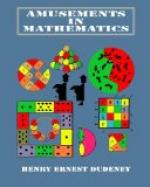Here is an illustrative example in which the enemy avoids capture as long as it is possible for him to do so. The Britisher’s moves are above the line and the enemy’s below it. Play them alternately.
24 20 19 15 11 7 3 1 2 6 10 14 18 19 20 24 ----------------------------------------------- 13 9 13 17 21 20 24 23 19 15 19 23 24 25 27
The enemy must now go to 25 or B, in either of which towns he is immediately captured.
396.—A MATCH MYSTERY.
If you form the three heaps (and are therefore the second to draw), any one of the following thirteen groupings will give you a win if you play correctly: 15, 14, 1; 15, 13, 2; 15, 12, 3; 15, 11, 4; 15, 10, 5; 15, 9, 6; 15, 8, 7; 14, 13, 3; 14, 11, 5; 14, 9, 7; 13, 11, 6; 13, 10, 7; 12, 11, 7.
The beautiful general solution of this problem is as follows. Express the number in every heap in powers of 2, avoiding repetitions and remembering that 2^0 = 1. Then if you so leave the matches to your opponent that there is an even number of every power, you can win. And if at the start you leave the powers even, you can always continue to do so throughout the game. Take, as example, the last grouping given above—12, 11, 7. Expressed in powers of 2 we have—
12 = 8 4 — —
11 = 8 — 2 1
7 = — 4 2 1
-------
2 2 2 2
-------
As there are thus two of every power, you must win. Say your opponent takes 7 from the 12 heap. He then leaves—
5 = — 4 — 1
11 = 8 — 2 1
7 = — 4 2 1
-------
1 2 2 3
-------
Here the powers are not all even in number, but by taking 9 from the 11 heap you immediately restore your winning position, thus—
5 = — 4 — 1
2 = — — 2 —
7 = — 4 2 1
-------
— 2 2 2
-------
And so on to the end. This solution is quite general, and applies to any number of matches and any number of heaps. A correspondent informs me that this puzzle game was first propounded by Mr. W.M.F. Mellor, but when or where it was published I have not been able to ascertain.
397.—THE MONTENEGRIN DICE GAME.
The players should select the pairs 5 and 9, and 13 and 15, if the chances of winning are to be quite equal. There are 216 different ways in which the three dice may fall. They may add up 5 in 6 different ways and 9 in 25 different ways, making 31 chances out of 216 for the player who selects these numbers. Also the dice may add up 13 in 21 different ways, and 15 in 10 different ways, thus giving the other player also 31 chances in 216.
398.—THE CIGAR PUZZLE.




